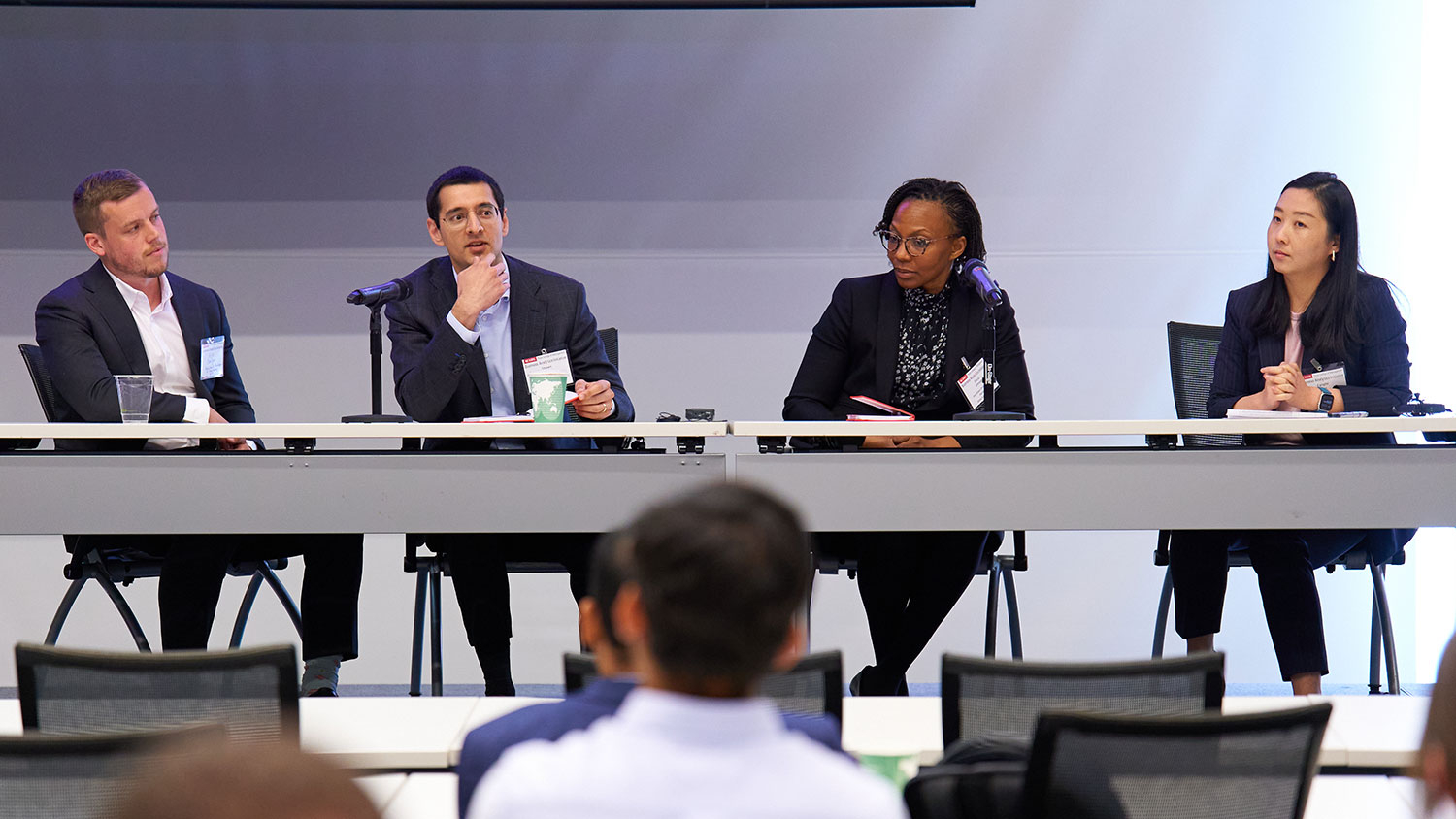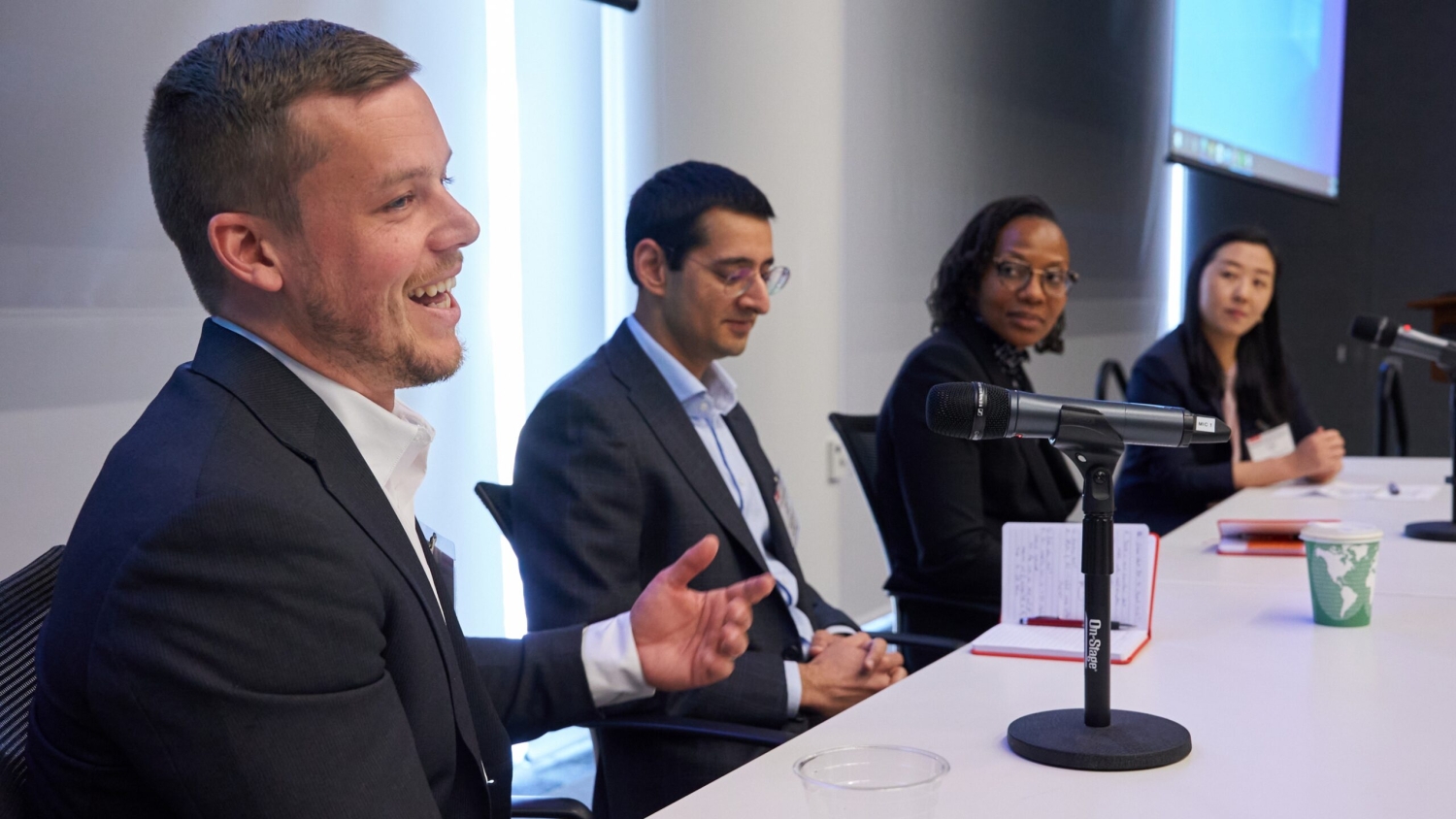Poole College’s Women in Technology Leadership and Management Panel Covers Range of Topics
Hosted by the Business Analytics and AI Initiative, the panel allowed NC State students to hear about technology professionals’ career journeys and gain actionable insights from their successes, challenges and opportunities.
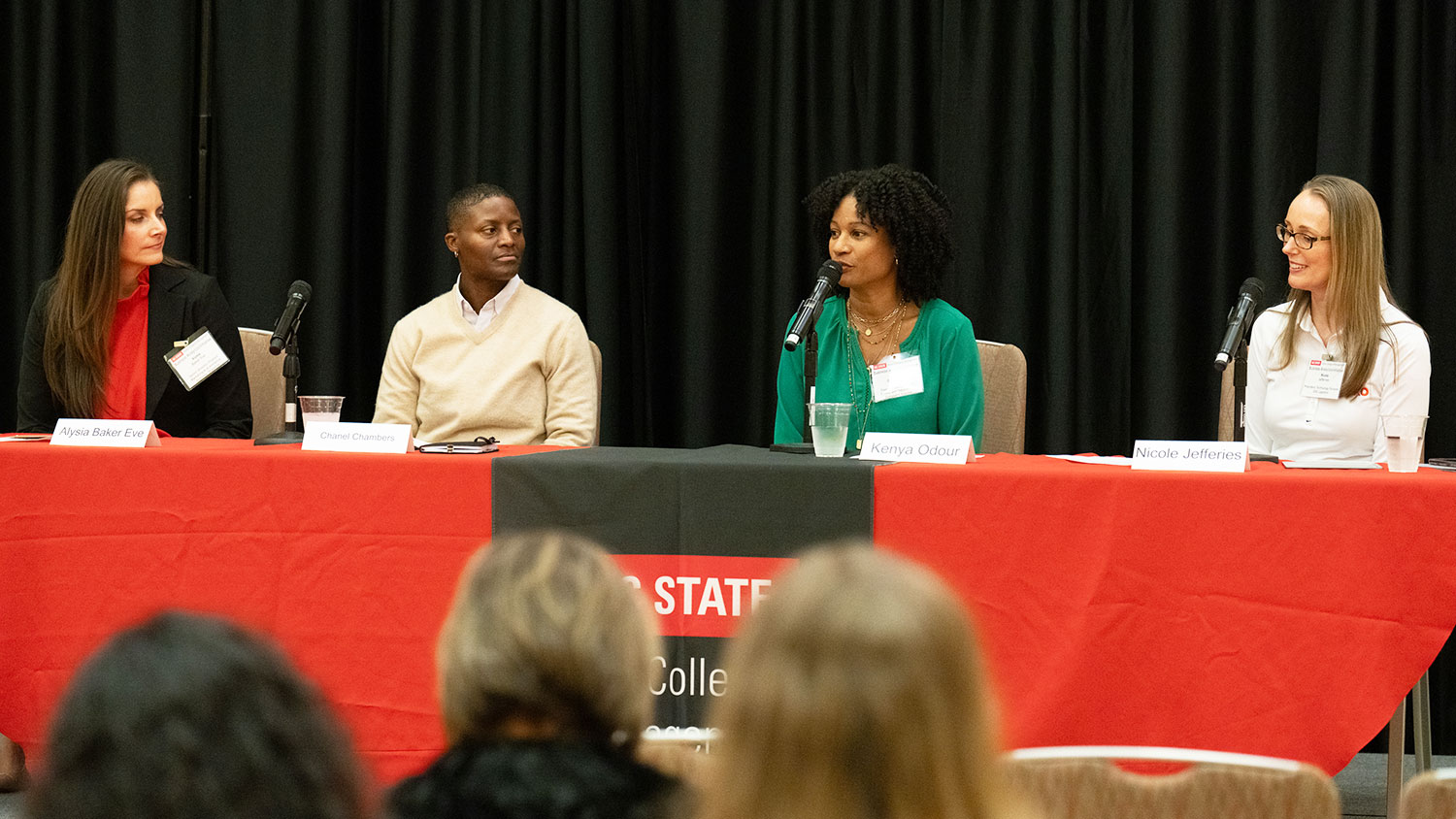
By Samantha Beavers
Changing careers, investing in mentors and navigating life as a working parent – these are just a handful of the topics discussed at the Women in Technology Leadership and Management Panel held in November at Talley Student Union.
Hosted by Poole College of Management’s Business Analytics and AI Initiative, the panel allowed NC State students to hear about technology professionals’ career journeys and gain actionable insights from their successes, challenges and opportunities.
“We hope to speak with authenticity about what our journeys look like and serve as resources for students who hope to follow in our footsteps,” said moderator Alysia Baker Eve (MBA ‘13), senior director of product marketing and e-commerce systems at ShareFile, to open the event.
Panelists for the evening included NC State alumna Chanel Chambers, vice president of product marketing at Lakeside Software; Kenya Oduor, founder and CEO of Lean Geeks, who earned her doctoral degree from NC State and serves as an adjunct professor in computer science at the university; and Nicole Jefferies, president of the technology division at GXO Logistics, Inc.
Pivotal Moments
Reflecting on their career journeys, the panelists discussed their shared interest in the intersection between humans and technology – as well as key moments in their careers.
“Technology doesn’t work without humans – and it also exists to serve humans. As I think about pivotal moments in my career, they are all times when I realized there’s a human factor in technology that I want to be part of,” Chambers shared.
Jefferies agreed, noting that one theme from her career is her curiosity about technology’s capabilities and its ability to transform the lives of those who interact with it. However, the turning points that stand out to her are moments marked not by clarity, but by doubt and uncertainty – like the time she realized she’d spent time and money preparing for a career in patent law that she no longer wanted.
“I got the opportunity to shadow IBM’s legal department and left with a pit in my stomach. What I thought an intellectual property lawyer did and what they actually did was not the same,” Jefferies explained. “So, I had to accept that my plan was no longer the plan. My new plan took me to business school and allowed me to combine tech and business together. The point is that you don’t have to have the whole journey mapped out. You just have to be willing to take the next step.”
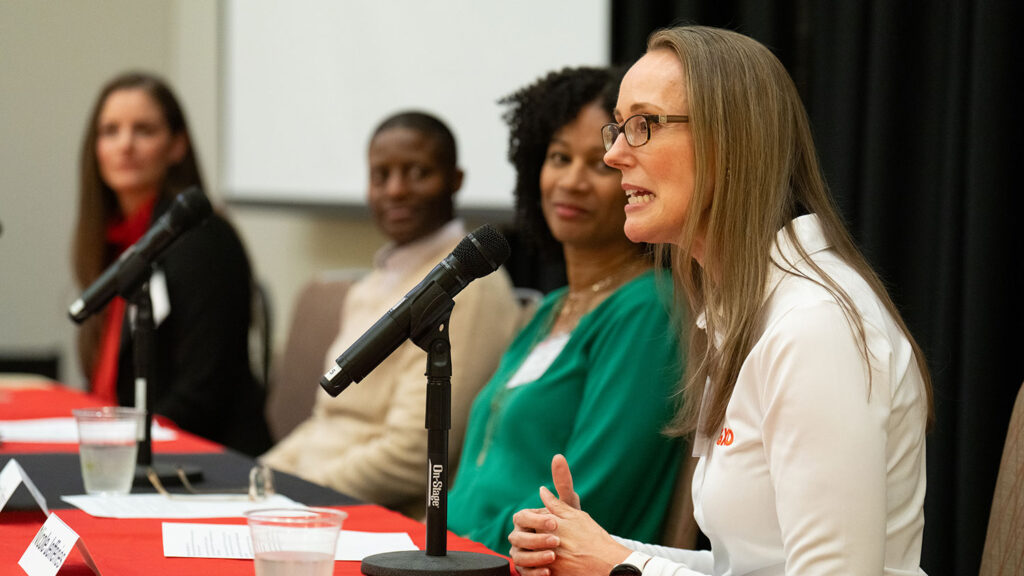
Guiding Principles
In these key moments, panelists found that holding onto their guiding principles helped determine their next steps.
“Over the course of your lifetime – several decades – the world will change and you will change. What won’t change, hopefully, are your guiding principles and your vision for how you hope your life will turn out. You might not know every step along the way, but it’s important to figure out what you want your life to look like,” Chambers explained. “I started as a band director because I wanted to change the world through people. Now, I sell software because I want to change the world through people.”
To stick to these guiding principles while remaining open to new opportunities, panelists encouraged the audience to take inventory of their past experiences and listen to signals of feedback from others.
“Introspection is really important. Have the ability to recognize – whether you succeeded or failed – what you learned. What in the experience shows you what you’re good at? As you build that repertoire of experiences, you begin to see patterns,” Oduor explained. “It’s also important to have mentors who can see things in you that you don’t see in yourself.”
Professional Mentors
Speaking on the topic of mentorship, the panelists explained the importance of cultivating and maintaining relationships. They agreed that some of the best mentorship relationships are organic relationships that add value bidirectionally, which is why asking to hear more about a concept from someone’s presentation – or better yet, telling them what you learned after putting the concept into practice – may be more powerful than asking, “Will you be my mentor?”
Jefferies also encouraged audience members to consider developing a personal “board of directors” made up of individuals with different perspectives and skill sets.
“Think about your personal company – your personal brand. What types of board members do you need? It changes based on where you are in life or your career,” she explained. “Some of those board members will come into your life organically. Others, you’ll have to seek out – and maybe even develop a profile of the kind of director you’re looking for. Think about adding value to those relationships so they stick.”
Career Harmony
While gaining feedback from mentors and peers is indispensable, the panelists agreed that getting quiet and asking themselves hard questions has made all the difference in their careers.
“This sounds harsh, but nobody cares about you as much as you care about you. At the end of the day, you’re responsible for your own life. You have to get to a point where you bet on yourself,” Chambers added. “If you spend time by yourself with your head and your heart, and you get to the point where they feel aligned – that’s the direction. Things didn’t start to work for me until I let my head and heart be in harmony.”
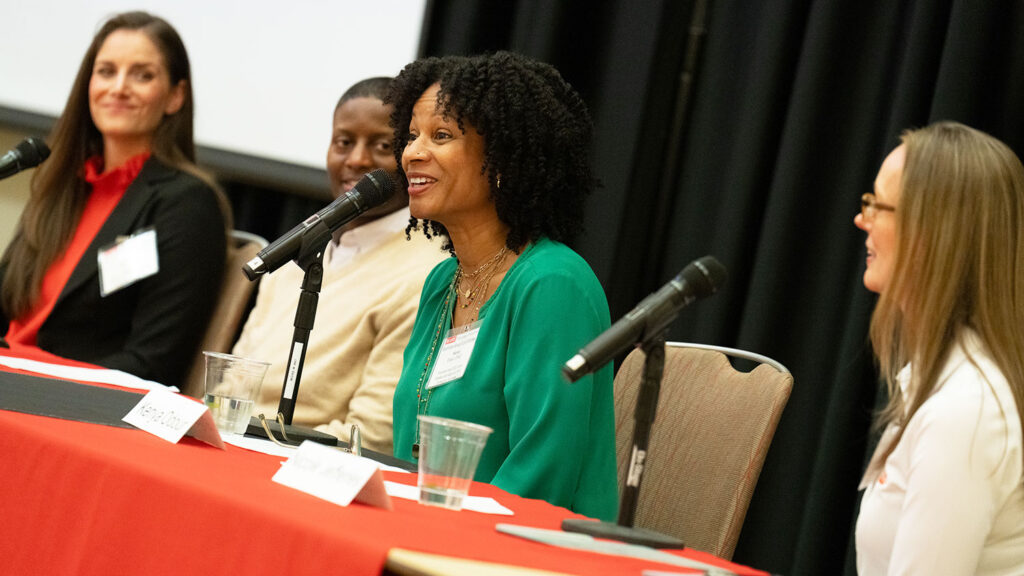
Panelists also responded to a question from the audience about what this looks like after having children, when there may be tension between one’s personal and professional life.
“I wish I could tell you that there’s a secret sauce to what you just asked,” Baker Eve said. “I have two boys – six and eight – so I get it. For me, the question has been, ‘What can I do with the gifts I’ve been given that make my time away from my family worthwhile?’”
“I started my company when my kids were both toddlers and my husband was in nursing school. I tried moonlighting when my kids went to bed and it was a disaster. Now that my kids have gotten older, I’ve been able to model that the sky’s the limit, bring them in where I can, and show them that I can’t do everything perfectly,” Oduor added. “Give yourself grace and understand that you have to look at the bigger picture of your life and figure out if it’s the right time to do whatever you want to do.”
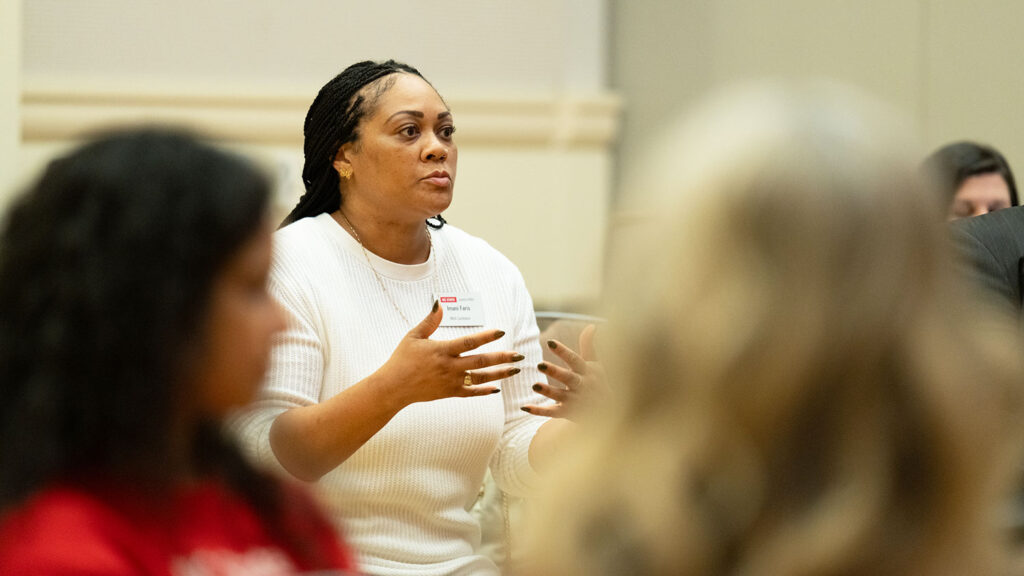
Personal Value
Finally, the panelists gave advice about how to communicate a personal value proposition in the midst of a career change. They encouraged audience members to brand themselves according to their skills, not the boxes their job titles have put them in, and to connect the dots for employers about how their skills translate to the new career path.
Most importantly, they encouraged audience members to embrace their stories – including all the different chapters that belong to it – and to learn to tell them in a compelling way.
“Figure out why you’re doing what you’re doing and learn to articulate that with conviction. Lead with what you want to do and put the rest of your life in that context,” Chambers said.
- Categories:

